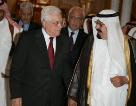Yoram Ettinger, Ynet, January 23, 2009
The mild reaction by
Arab countries to the Hamas-driven Palestinian predicament in Gaza refutes the assumption that the Palestinian issue is a top Arab priority and that it constitutes the core cause of Arab hostility toward the West, USA and Israel. In fact, the Arab reaction has reflected overall Arab attitude toward the Palestinian issue since 1948, through the 1982 Israel-PLO war in Lebanon and the First and Second Intifadah, irrespective of the identity of the Palestinian leadership: Haj Amin al-Husseini, Shukeiri, Hammuda, Arafat, Abu Mazen or Haniyeh.
Arab countries have always showered Palestinians with rhetoric, but they have refrained from significant support. During the 2009 Gaza War, Arab countries rejected the call for an emergency session of Arab leaders on behalf of Gaza. They have limited their meek support to a gathering of Arab foreign ministers, calling for a UN emergency session. Saudi Arabia dismissed the suggestion to employ oil as a weapon. Riad prohibits pro-Palestinian rallies and its religious establishment issued a weak proclamation on behalf of the Palestinian struggle. The Gulf Cooperation Council focused on economic and monetary issues during its December 30, 2008 meeting, according lips service to Gaza.
A similar reaction occurred during the 1982 Israel-PLO war in Lebanon, which erupted on June 4. The Arab oil producing countries convened in August to discuss the price of oil, dismissing the proposal to use the oil weapon on behalf of the PLO. The summit of Arab leaders was deliberately delayed until September, following the expulsion of the PLO from Beirut.
Arab leaders have systematically demonstrated how secondary the Palestinian issue has been in their order of national priorities. For instance, Arab financial support of the PLO was less than 10% of Arab financial support to the anti-Soviet Muslims in Afghanistan. In 1988, the Arab League convened on behalf of the First Intifadah, committing itself to $128MN immediate support, followed by $43MN monthly assistance. Less than $100MN was actually transferred to the PLO, compared with over $1BN annual support to Afghanistan during 1978-1988. In 2002, Saudi Arabia pledged $600MN for the Second Intifadah, but only $100MN has been transferred so far. Other Arab countries made a $55MN monthly commitment, but – as expected – they have once again failed to deliver.
Recent precedents have led Arabs to consider the Palestinians a potential treacherous, subversive, explosive Pandora's box, which could undermine their survival. On the other hand, Palestinians blame Arab leaders for the "1948 Debacle." In 1948/9, the Arab League made it clear that the war against the Jewish State was not launched because – or for – the Palestinians. It declared the provisional Palestinian government null and void, while Egypt and Jordan expelled the Palestinian leadership from Gaza, Judea and Samaria. During the late 1950s, and in 1966, Arafat, Abu Mazen and their Fatah colleagues were evicted from Egypt and Syria for subversion. In 1970, they were decimated in Jordan, following an attempt to topple the Hashemite regime ("Black September"). In 1975/76, they were clobbered by Syria (in Lebanon), as a result of their assault on the central government in Beirut ("Black June"). In 1983, they lost their base in Tripoli, Lebanon, after they failed to challenge the dominant local militia. In 1987, Egypt killed scores of Palestinians, who demonstrated on behalf of the First Intifadah in the Rafah refugee camp in Sinai/Gaza. In 1991, Kuwait expelled 300,000 Palestinians for collaboration with Saddam's plunder of the sheikhdom. Since 2003, thousands of Palestinians have fled Iraq, due to their identification with the Butcher of Baghdad. The Red Carpet, which welcomes Palestinian leaders at the UN and in Western capitals, is transformed into a shabby rug upon landing in Arab capitals.
What do Arab leaders know - about the Palestinians - which has escaped Western and Israeli policy-makers?
Arab leaders have not dedicated themselves to advance the Palestinian cause. They have not regarded the Palestinian issue as a premier link in the formulation of their policies. Domestic, regional and global factors have impacted inter-Arab, Arab-Western and Arab-Israel relations much more than the Palestinian issue. Palestinians do not possess veto power over Arab policy-making.
Since the 1993 Oslo Accord, Israel has subordinated its national security policy to the resolution of the Palestinian issue, switching its focus from the Israeli-Arab path to the Israeli-Palestinian path. Dozens of initiatives, conferences, summits, agreements and cease fires have yielded a series of short-lived illusions of peace and security, which were promptly crashed by an unprecedented Palestinian wave of hate-education, violation of commitments and terrorism. In fact, the roadmap toward the resolution of the Arab-Israeli conflict does not go through Ramallah or Gaza, but rather through Cairo, Amman and other Arab capitals, as evidenced by Israel's peace treaties with Egypt and Jordan, which have withstood Palestinian opposition and an on-going Israeli war against Palestinian terrorism.
A policy which is based on an erroneous assumption – that the Palestinian issue is supposedly the crown jewel of Arab policy – constitutes an erroneous policy. It exacerbates regional instability, fuels terrorism, promotes war and diminishes the prospects for peace.
Israel should base its policy, toward the Palestinians, on the track record of the last 100 years, and especially the last 15 years, which have featured the failure of Land-for-Peace on the Palestinian track.
Lessons of recent history, Israel's minimal security requirements and the need to minimize motivation for Arab terrorism, highlight the necessity to solidify Israel's control of Judea and Samaria.







